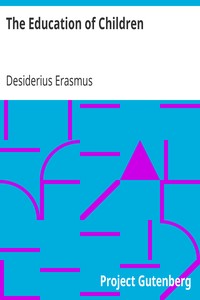The Education of Children by Desiderius Erasmus
"The Education of Children" by Desiderius Erasmus is a philosophical treatise written in the early 16th century. The text emphasizes the significance of nurturing children in virtue and learning from an early age, advocating for a thoughtful and comprehensive approach to education and upbringing. As one of the most renowned figures of the Renaissance, Erasmus reflects on the moral and intellectual development of children, addressing both parents and educators on their responsibilities.
The opening of the work establishes a foundational argument for the careful schooling of young children, emphasizing that early education is crucial in shaping their character and intellect. Erasmus argues against the common belief that childhood is too immature for serious learning, insisting instead that the malleable mind of a child is highly receptive and should be cultivated immediately with the right teachings. He encourages parents to be diligent in selecting suitable educators while also engaging in their children's education themselves, stating that the cultivation of both body and mind is paramount in creating virtuous and capable individuals. Through various analogies, including comparisons to animals and the cultivation of plants, Erasmus illustrates that early and effective education lays the groundwork for a fruitful life, ultimately benefiting both families and society. (This is an automatically generated summary.)
Read or download for free
| How to read | Url | Size | |||
|---|---|---|---|---|---|
| Read now! | https://www.gutenberg.org/ebooks/28338.html.images | 182 kB | |||
| EPUB3 (E-readers incl. Send-to-Kindle) | https://www.gutenberg.org/ebooks/28338.epub3.images | 163 kB | |||
| EPUB (older E-readers) | https://www.gutenberg.org/ebooks/28338.epub.images | 131 kB | |||
| EPUB (no images, older E-readers) | https://www.gutenberg.org/ebooks/28338.epub.noimages | 104 kB | |||
| Kindle | https://www.gutenberg.org/ebooks/28338.kf8.images | 316 kB | |||
| older Kindles | https://www.gutenberg.org/ebooks/28338.kindle.images | 253 kB | |||
| Plain Text UTF-8 | https://www.gutenberg.org/ebooks/28338.txt.utf-8 | 163 kB | |||
| Download HTML (zip) | https://www.gutenberg.org/cache/epub/28338/pg28338-h.zip | 159 kB | |||
| There may be more files related to this item. | |||||
Similar Books
About this eBook
| Author | Erasmus, Desiderius, 1469-1536 |
|---|---|
| Translator | Sherry, Richard, 1506?-1555? |
| Title | The Education of Children |
| Note | Reading ease score: 70.2 (7th grade). Fairly easy to read. |
| Credits |
Produced by Louise Hope, Greg Lindahl, Joseph Cooper and the Online Distributed Proofreading Team at https://www.pgdp.net (This file was produced from images generously made available by the Bibliothèque nationale de France (BnF/Gallica) at http://gallica.bnf.fr) |
| Language | English |
| LoC Class | LA: Education: History of education |
| Subject | Education -- Early works to 1800 |
| Category | Text |
| EBook-No. | 28338 |
| Release Date | Mar 16, 2009 |
| Most Recently Updated | Jan 4, 2021 |
| Copyright Status | Public domain in the USA. |
| Downloads | 222 downloads in the last 30 days. |
| Project Gutenberg eBooks are always free! | |


